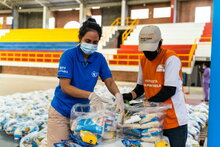Training Workshop Explores The Potential Of Drones For Humanitarian Operations
SANTO DOMINGO – Representatives of the Dominican Government and international organizations involved in risk management and disaster response will team up on a three day workshop starting today to explore the use of drones for humanitarian purposes in emergencies.
Operating under the Forecast-Based Financing project, the United Nations World Food Programme (WFP), with the support of the Emergency Operations Centre (EOC), is hosting the first workshop on the “Use of Drones for Humanitarian Interventions,” facilitated by experts from WeRobotics and WFP.
The meeting aims to strengthen national abilities in the Dominican Republic on the use of drone technology and build strong cooperation between all interested groups, including government and humanitarian organisations.
On the agenda is a review of the current coordination model and its effectiveness, possible partnerships and drone activities around the world, as well as hands-on training. The aim is to define operational protocols for the use of drones, specifically in predicting and monitoring natural events, as well as for assessments after disasters, and the creation of inter-agency groups. The participants will also discuss what they may need in humanitarian projects and their strategies for the implementation of drone technology.
Technological advances in drones have the potential to transform humanitarian response operations. For example, drones can provide “Wi-Fi in the sky”, monitor situations in real-time, and make efficient situational assessments. Drones can be used for damage assessment after disasters and to make preventive or operational decisions that help strengthen risk management in the Dominican Republic.
In addition to the representatives from the Emergency Operations Centre (EOC), there will be participants from the Ministries of Agriculture and Environment, the National Institute of Hydraulic Resources (INDRHI), the National Meteorological Office (ONAMET), Civil Defence, the National Institute of Drinking Water (INAPA) and the National Geological Survey (SGN), among others.
The Belgian Development Cooperation has contributed € 500,000 to the WFP Information Technology Unit to design solutions for the effective use of drones to share with the community of humanitarian responders, as well as to address the potential risks of information security.
This workshop follows on from the first summit on the coordination of humanitarian drones, organized by the Belgian government and WFP, in Brussels in February which sought to provide a forum for all stakeholders, including humanitarian organisations, government officials and technical experts.
# # #
WFP is the world's largest humanitarian agency fighting hunger worldwide, delivering food assistance in emergencies and working with communities to improve nutrition and build resilience. Each year, WFP assists some 80 million people in around 80 countries.
See also:
www.wfp.org/es
http://www.facebook.com/ProgramaMundialdeAlimentos
http://twitter.com/wfp_es
For more information, please contact (email: fernando.salazar@wfp.org):
Fernando Salazar, WFP/Dominican Republic, 829-213 4686.

